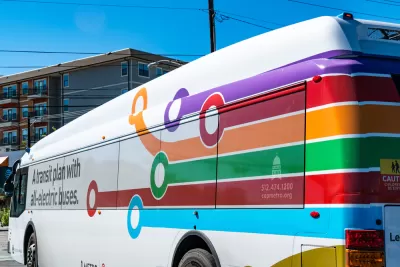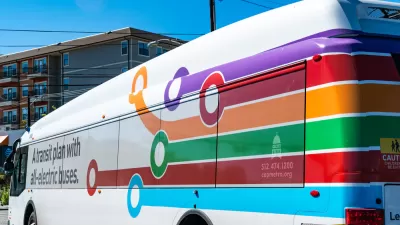A once sprawling and singularly ambitious capital investment plan for the Capital Metro system will soon be reduced in size and scope. The episode is more evidence of an emerging era of transit planning austerity.

Project Connect, the Austin region’s far-reaching and sweeping transit investment plan was made possible when voters approved a new 8.75-cent property tax in 2020. Since then, however, Capital Metro’s planning partners have struggled to begin projects, a trend that culminated with an announcement in 2022 that a reduction from the original vision set forth by the plan was necessary.
On the cusp of a community engagement process to consider revisions to the plan, an article published by TransitCenter considers the lessons from Project Connect as transit agencies around the country—most notably in Atlanta and New York City—reduce their planning ambitions amid labor shortages, increasing construction costs, inflation, and stagnant ridership.
The sources quoted in the article discuss the lessons learned so far, about the importance of governance and the challenges presented by unforeseen engineering and political obstacles.
Overall, the message from local advocates is optimistic. Project Connect is still viable, it just has a few hurdles still to overcome.
FULL STORY: Austin’s First Attempt at a Big, Urban Transit System Has More Obstacles to Overcome

Planetizen Federal Action Tracker
A weekly monitor of how Trump’s orders and actions are impacting planners and planning in America.

Congressman Proposes Bill to Rename DC Metro “Trump Train”
The Make Autorail Great Again Act would withhold federal funding to the system until the Washington Metropolitan Area Transit Authority (WMATA), rebrands as the Washington Metropolitan Authority for Greater Access (WMAGA).

The Simple Legislative Tool Transforming Vacant Downtowns
In California, Michigan and Georgia, an easy win is bringing dollars — and delight — back to city centers.

The States Losing Rural Delivery Rooms at an Alarming Pace
In some states, as few as 9% of rural hospitals still deliver babies. As a result, rising pre-term births, no adequate pre-term care and "harrowing" close calls are a growing reality.

The Small South Asian Republic Going all in on EVs
Thanks to one simple policy change less than five years ago, 65% of new cars in this Himalayan country are now electric.

DC Backpedals on Bike Lane Protection, Swaps Barriers for Paint
Citing aesthetic concerns, the city is removing the concrete barriers and flexposts that once separated Arizona Avenue cyclists from motor vehicles.
Urban Design for Planners 1: Software Tools
This six-course series explores essential urban design concepts using open source software and equips planners with the tools they need to participate fully in the urban design process.
Planning for Universal Design
Learn the tools for implementing Universal Design in planning regulations.
Smith Gee Studio
City of Charlotte
City of Camden Redevelopment Agency
City of Astoria
Transportation Research & Education Center (TREC) at Portland State University
US High Speed Rail Association
City of Camden Redevelopment Agency
Municipality of Princeton (NJ)




























